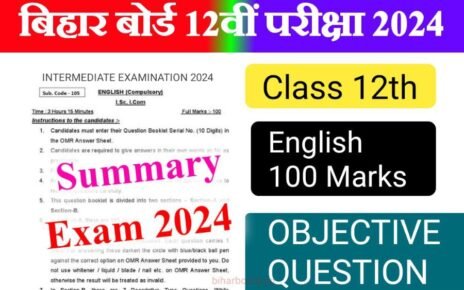Bihar Board Class 12th English Top Essay Exam 2024: बिहार बोर्ड 2024 परीक्षा के लिए Guess Essay, Exam 2024,
तो दोस्तों यह निबंध आपके लिए बहुत Important है –
1.Answer any three of the following in about 100-120 words: (Guess 2024)
(a) Write a summary of any one of the following poems:
(i) Snake
(ii) Sweetest Love, I Do Not Goe
(iii) Fire-Hymn
(b) Write a summary of any one of the following proses pieces:
(i) How Free is the Press
(ii) India Through a Traveller’s eyes
(iii) The Artist
(a) (1) Snake
David Herbert Lawrence wrote the poem ‘Snake’. He told about Snake in this poem. He said that one night when he felt thirsty come out to drink but as soon as come out he saw a black cobra which also come to drink water. It was too hot to night. The snake was looking good, silent, and peaceful. It came out from a carobtree to a water through only for drink water. To see it politeness the poet didn’t fear at first but his sense of humour fells him that he should kill the snake at anycost. But the snake was too peaceful to hit. After some time, the poet decided to hit the snake. He went to pick up a stick to hit the snake. He hit the snake speedily and the snake was killed by the poet. It was looking posionous. The poet didn’t want to kill him but if he didn’t kill him, he was killed by the snake.
(ii) Sweetest Love, I Do Not Goe
(ii) Sweetest Love, I Do Not Goe The poem “Sweetest Love I Do Not Goe” is a wonderful poem composed by the poet John Donne. In this poem, the poet tells about love. It means one who loves someone sodearly, if she lefts him how he feels at that moment. The speaker also loves so meone so much. He tells about his beloved in wonderful ways. He says that his beloved is so beautiful and so cute that none can forget her. But when he went to his beloved to tell her about his love she, his beloved, just refused his love. Love is a way of life which teaches a man to live. A man’s life is dull without love. A man can do anything if he loves someone. It can change the life style of a man. It makes the life journey speedier than earlier. A person knows everything if he does love. As a sun it also shows the rays of light. It teaches us the art of love which makes us happy,
(iii) Fire-Hymn
‘Fire Hymn’ is a heart-touching poem by an outstanding Indo-Anglian poet, Keki N. Daruwalla. In this poem, he has vividly and realistically depicted the horrifying scene of a burning ghat where the dead body is consigned to flame on a funeral pyre.
The sight of the burning ghat in the darkness of night creates the feelings of shock and horror. Sometimes, some limbs of the dead body are left half-burnt because the fire fails to perform its duty. The poet belongs to the Parsi community which worships fire as a god. He has come to such a ghat to cremate his own son because the nearest Tower of Silence, the Parsi’s funeral place, was a thousand miles away. The Parsi religious codes do not permit the burning of the dead body on a Hindu burning ghat but the poet has come there to remind the fire of its own sin of failing to burn the whole body by cremating his own son there. Thus the poem has subtle irony and sarcasm against religious rituals.
(b) (i) How Free is the Press
How free is the Press’ is an essay written by Dorothy Leigh Sayers. She expresses her strong idea against the misuse of press. She wants that the freedom of press should be handled properly with an intention of the welfare of the humanity as a whole. She says freedom of press is neces- sary for freedom of people but at war times such freedom is restricted. However, after the war it must be removed. Freedom of press means that without any influence of outer source the press should clearly publish the fact related to
government, politics, society, etc.. Sometimes this freedom may be harmful. In Great Britain, it is quite free and peaceful. It may become disastrous not by control on it but if left uncontrolled to manufacture public opinion.
The editorial policy depends upon two factors. First, the interest of the advertisers, second, the wealth of the owner of the press. They don’t write against their advertisers. They often come under the influence of the owner’s life and surrounding. The Press believes that the public have no wit of their own to distinguish right and wrong and they want a titiuating news, other factors having almost no influence. Some examples as how they create sensations are through sensational: Headlines, Grabling i.e. through interviews, inaccurate reporting of facts and plain reversal of facts, random and intentional invention, intentionally expressing about some achievment and flat suppression. To get such falsehood is an exhausting experience for public. No books dare to go against press malfunctioning. Speeches may not get proper space. All these are the problems though may look small. Decent journalists do not like this poor state. But all rests on the common people. Are they ready to go against the wrong? Are they ready to do the needful? Are they ready to perform honestly and bravely? These are the factors which may effect ultimately..
(ii) India Through a Traveller’s eyes
(ii) India Through a Traveller’s Eyes Pearl S. Buck was highly impressed by India though he was an American. In his own words, he describes India. He says, India had always been part of the background of my life, but I had never seen it whole and for myself until new Yet the stories that our Indian family doctor and his wife told me when I was child had woven themselves into my growing dreams, and I had long read everything that I could find about that country-from my father I had learned of it through Budhism and the life history of the Lord Bud- dha. What did I go to India to see? Not the Taj Mahal, although I did see it and by moonlight, not Fatehpur Sikri, although I did see it, and not the glories of empire in New Delhi, although I did see them. I want to India to see and listen to two groups of people, the young intellectuals in the cities and the peasants in the villages. There I met in little rooms in the city, in little houses in the villages, and I heard their plans for freedom. Already the intellectuals believed that another world war was inevitable. They had been bitterly disappointed after the first world war by what they felt were the broken promises of England. The Eng- lish, they declared, had no real purpose to restore India to the people. I could believe it fresh as I was from China. Where the period of people’s Tutelage seemed endless and self government further off every year. When you are ready for independence, conquerours have always said to their subjects, etcetera! But who is to decide when that moment comes and how can people learn to govern them- selves except by doing it? Thus, experience matters a lot. So the intellectuals in India were restless and embittered, and I sat though hours watching their plashing dark eyes. Indians believe in labour. They strive hard untill they get success.
(iii) The Artist
Sebei had a hobby for collecting gourds. He got them for a few sen. When he came home, he world first bore a neat hole in the top of the gourd and extract the seeds. There he covered them with tea-leaves to get rid of the bad smell of gourd.
Seibei was passionately interested in gourds. He was twelve years old and still at primary school. After class he usually wondered about the town looking for gourds. In the evening, he would sit in the corner of living room working on his newly acquire fruit. When he had finished treating it, he poured in a little sake, inserted a cork stopper, wrapped it in a towel put this in a tin and finally placed the whole thing in the charcoal foot warmer. Then he went to bed. Next morning first of all he examined the gourd and hanged them in the sun. He lived in a harbour town. He almost used to walk in the town. Then he came to every place that sold gourds and to recognise almost every gourd on the market. But his father did not like it. One day Seibei saw about five inches long gourd. He became curious. He wanted to know everything about that. So he went home and in no time returned at the stall with money. He bought the gourd and took it home.
Se bei’s father wanted to his son became a learned person. He always wanted him that he studied well. His father dicn’t like his son’s work whatever Seibei was doing. Seibei’s father didn’t want to listen any complain of his son. His desires were to give up his son unwanted work and unwanted things. For this view he always guided his son and at last by forcibly he made him to give up that work and that things.
Seibei had no complains. Now he was busy in making pictures. (c) English is said to be a global language as no other language is read and spoken in so many countries as it is. Naturally, it has becomes the language of international trade, commerce, science an diplomacy. Although it has acquired the distinction of being international language. It has been conditioned to the use of local expression. American English, for instance, differ in spelling of lots of words. The expressions, too, is distinctively its own.
Similarly Indian English has been conditioned in local (Indian) way of life. In the novels of Mulk Raj Anand, we find the use of local dialect so abuses are concerned. Some local (Indian) phrases have also become popular. Thus, English, without any doubt, may be caned global English.
Or, Dialects of Middle English existed in both spoken and written form which covers a period of about 350 years (1150-1500 AD) which is primary dialectical and hence it is different from modern English which is a standered language.
As Middle English veried from country-to-country, it had five dialects. They are as follows: (i) Northern (ii) Southern (iii) East midland (iv) West midland and (v) Kentish.
Modern English evolved from the East midland dialect.
Or, Received pronunciation uncountable noun. Received pronunciation is a way of pronouncing British English that is often used as a standard in the teaching of English as a foreign language. The abbreviation receive pronunciation is also used. The accent represented by the pronunciation in this dictionary is received pronunciation. It is often abbreviation to received pronunciation is an accent of spoken English. Unlike other UK accents, it’s identified not so much with a particular region as with a particular social group, although it has connection with the accent of southern England received pronunciation is associated with educated speaker and formal speech. It has connotation of prestige and authority but also of privilege and arrangance.




